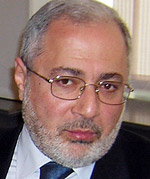It’s not that there is no corrupted official in Armenia, rather there is no political will to revean and punish the corrupted official.
These days the highest-ranking Armenian official, vice-speaker of the National Assembly Vahan Hovhannisyan is also in favor of this overall opinion (the Armenian President, the Prime Minister and the National Assembly speaker are currently out of the country). Which part of the authorities lack the political will-the Armenian Republican Party (ARP), the ARF, or other parties? According to the Dashnak vice-speaker, one party alone can’t investigate and arrest. “That’s why there are special bodies for that. But it’s not always that those special bodies are effective,” said Hovhannisyan and added that besides that the person who commits a crime isn’t criticized by the society. The vice-speaker of the National Assembly agrees that raising the salaries of the high-ranking officials of Armenia is one of the ways of fighting against corruption, “but that is just one of the methods and it’s not enough.” Hovhannisyan claims that the corrupted officials must be punished severely, however he doesn’t mention any names. But he does mention that the tranquility of the political field only appears that way. He considers it dangerous that some political parties are trying to find sponsors, especially from abroad. Hovhannisyan takes notice of the fact that having money is not enough and worries that there may be new ways of doing things and “the youth in need of the new may just swallow the bait”.
V. Hovhannisyan also believes that after the upcoming National Assembly elections, there won’t be any “sensational changes” at the National Assembly. Touching upon the pre-election activities, the ARF member vice-speaker of the Armenian parliament mentioned that the real charity is when you give and don’t expect anything in return. According to him, similar organizations include the Armenian Relief Society (ARS) and the Armenian General Benevolent Union (AGBU). “As for those who simply do good deeds like handing out free items, asphalt yards, repair roofs, elevators, etc., expect to get votes in return. At least that’s the impression,” mentioned Hovhannisyan, adding that that can’t be punished because you can’t punish someone for doing good deeds. “It’s up to the people to decide whether to give what they expect in return or not,” he says. He compared the current situation in Armenia with a well-known event in Russian history, which is called “cormlenie” (feeding). According to V. Hovhannisyan, at the time the Russian king would summon the governors, who were called “voevods”, wouldn’t pay them their salaries, but he would assign them to collect the taxes, ensure local authority, guarantee obedience and get their salaries from the collected salarires. However around the 18th century, Russian czars realized that that is a dangerous system because that way, each official was striving to come to power. As a result, the system has changed, but according to the National Assembly vice-speaker, the approach has stayed the same and has made it to modern-day Armenia. He believes that if the state levies all the taxes, then there won’t be any need for charities. Hovhannisyan describes what’s going on in the following way: “People don’t pay their taxes fully, the remainder, which is stolen from the people and the state could have given that money to the people, is already distributed differently to the people and that’s just wrong from the start.” However, he also believes that the government should be able to prevent this from happening but can’t because very often, the same people “who are feudalists in the economic field” also represent the circles of political activists. During the press conference V. Hovhannisyan didn’t mention the names of any “voevod-feudalists”. He says that the people of Armenia know them and he doesn’t want to mention them out loud because “we don’t want to turn the struggle into a scandal.” He assures that the chief authorities hear those names. Journalists reminded Hovhannisyan that in 1998, the ARF was talking about the former authorities by mentioning names and those names, as criminals, were heard during the public meetings. What has changed? Why aren’t they giving out names? Hovhannisyan explained that they realized that giving out names doesn’t help solve anything, they are more realistic and have changed their approach and only mention those names in narrow circles of authority figures. But it turns out that that approach isn’t helpful because Hovhannisyan wasn’t able to bring up an example of punishing the people who were mentioned in those narrow circles of authority figures. “The problem is that we can’t do that either because the others, who haven’t been punished yet, resist even more,” he said.

